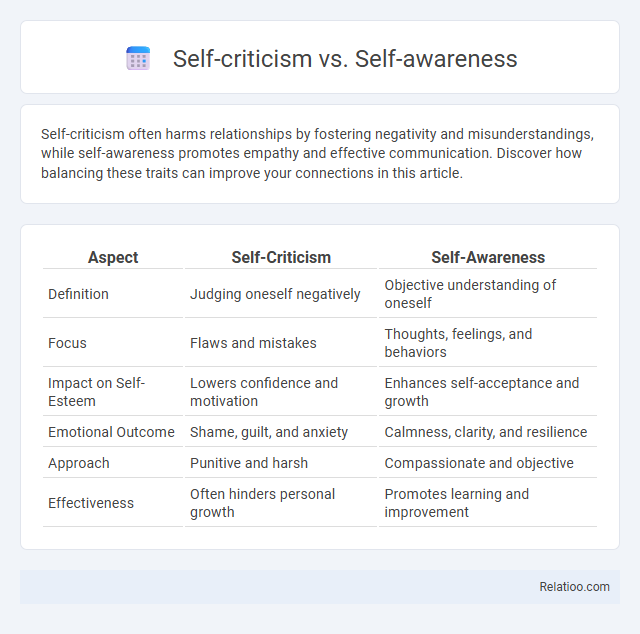Self-criticism often harms relationships by fostering negativity and misunderstandings, while self-awareness promotes empathy and effective communication. Discover how balancing these traits can improve your connections in this article.
Table of Comparison
| Aspect | Self-Criticism | Self-Awareness |
|---|---|---|
| Definition | Judging oneself negatively | Objective understanding of oneself |
| Focus | Flaws and mistakes | Thoughts, feelings, and behaviors |
| Impact on Self-Esteem | Lowers confidence and motivation | Enhances self-acceptance and growth |
| Emotional Outcome | Shame, guilt, and anxiety | Calmness, clarity, and resilience |
| Approach | Punitive and harsh | Compassionate and objective |
| Effectiveness | Often hinders personal growth | Promotes learning and improvement |
Understanding Self-Criticism: Definitions and Origins
Understanding self-criticism involves recognizing it as the internal dialogue where you judge or evaluate your actions and character, often rooted in early life experiences and societal expectations. Self-awareness differs by fostering a conscious recognition of your thoughts and behaviors without immediate judgment, enabling growth and emotional regulation. Distinguishing these concepts helps you manage self-critical tendencies constructively while developing healthier self-awareness.
What is Self-Awareness? Key Features Explained
Self-awareness is the conscious knowledge of one's own character, feelings, motives, and desires, enabling individuals to understand their impact on others and make informed decisions. Key features include emotional regulation, introspective reflection, and the ability to recognize personal strengths and weaknesses without harsh judgment. Unlike self-criticism, which often involves negative evaluation, self-awareness promotes balanced self-observation and growth-oriented insight.
The Psychological Impact of Self-Criticism
Self-criticism often leads to negative psychological effects such as increased stress, anxiety, and lowered self-esteem, impairing your mental well-being. In contrast, self-awareness promotes emotional regulation and resilience by fostering a deeper understanding of your thoughts and behaviors without judgment. Balancing self-awareness with constructive self-assessment helps mitigate the harmful impacts of harsh self-criticism while encouraging personal growth.
Benefits of Cultivating Self-Awareness
Cultivating self-awareness enhances emotional intelligence by allowing individuals to recognize and regulate their emotions effectively, leading to improved decision-making and interpersonal relationships. Unlike self-criticism, which can hinder growth through negative judgment, self-awareness promotes constructive reflection and personal development. Developing self-awareness fosters resilience, mental clarity, and supports a balanced perspective on one's strengths and weaknesses, facilitating continuous self-improvement.
Self-Criticism vs Self-Awareness: Core Differences
Self-criticism involves evaluating oneself with a focus on perceived flaws and mistakes, often leading to negative emotions and reduced self-esteem. Self-awareness, by contrast, is the conscious knowledge of one's character, feelings, motives, and desires, fostering a balanced and objective understanding of oneself. The core difference lies in self-criticism's judgmental nature versus self-awareness's reflective and non-judgmental process.
How Self-Criticism Hinders Personal Growth
Self-criticism often creates barriers to personal growth by fostering negative self-perceptions that reduce motivation and increase stress. Unlike self-awareness, which encourages objective reflection and adaptive change, harsh self-criticism leads to diminished confidence and avoidance of challenges. Cultivating self-awareness instead of self-criticism supports emotional resilience and continuous improvement.
The Role of Self-Awareness in Emotional Intelligence
Self-awareness is a crucial component of emotional intelligence, enabling individuals to recognize and understand their own emotions and how they affect thoughts and behavior. Unlike self-criticism, which often involves harsh judgments and negativity, self-awareness promotes a balanced and compassionate understanding of one's inner experiences. This heightened awareness fosters better emotional regulation, improved decision-making, and stronger interpersonal relationships.
Transforming Self-Criticism into Constructive Self-Reflection
Self-criticism often leads to negative self-judgment, while self-awareness fosters a clear understanding of your thoughts and behaviors without harsh evaluation. Transforming self-criticism into constructive self-reflection involves shifting focus from fault-finding to recognizing growth opportunities and learning from experiences. This approach enhances emotional resilience, promotes personal development, and supports healthier self-perception.
Practical Strategies to Develop Self-Awareness
Developing self-awareness involves practical strategies such as mindful reflection, journaling, and seeking feedback from trusted peers to gain an accurate understanding of personal strengths and weaknesses. Unlike self-criticism, which often leads to negative self-judgment, self-awareness promotes objective evaluation and emotional regulation, enabling constructive personal growth. Incorporating techniques like meditation and experiential learning further enhances emotional intelligence and decision-making skills, fostering a balanced self-perception.
Choosing Self-Awareness Over Self-Criticism for Well-being
Choosing self-awareness over self-criticism promotes emotional resilience and mental well-being by fostering a non-judgmental understanding of one's thoughts and behaviors. Research reveals that self-awareness, marked by mindful reflection and acceptance, enhances motivation and personal growth, whereas self-criticism often triggers stress, anxiety, and reduced self-esteem. Cultivating self-awareness enables healthier coping strategies and improved interpersonal relationships, underpinning overall psychological health.

Infographic: Self-criticism vs Self-awareness
 relatioo.com
relatioo.com